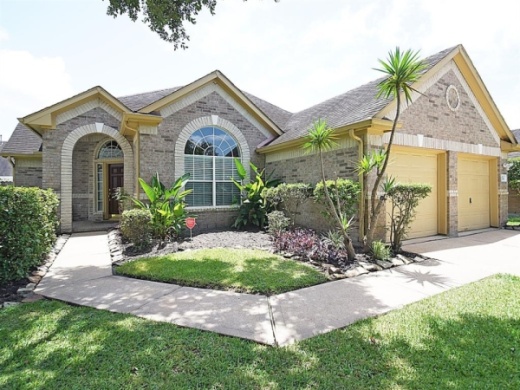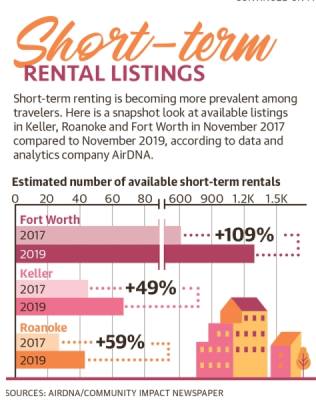The city already prohibits these short-term rentals in neighborhoods. But even with that restriction, the city had anywhere from about 800 to more than 1,200 listings a month last year, according to data and analytics company AirDNA.
“Essentially everywhere but residential [zoning districts], we allow short-term rentals,” said Randle Harwood, Fort Worth planning and development director, during a September presentation to City Council.
Neither Keller nor Roanoke has regulations on short-term rentals, which allow properties to be booked by guests for fewer than 30 days via various online services. But both cities combined have fewer than 120 listings each month, AirDNA data showed.
“[Other] cities from Arlington to Grapevine to Austin are all dealing with this,” Fort Worth Council Member Cary Moon said. “Obviously, the one thing those three cities have in common is tourism. Given technology, there’s a big, easy opportunity for people to rent their house for short-term rentals.”
Moon released a one-question poll on his website in early January.
“Per city ordinance, Fort Worth does not allow short-term rentals,” Moon’s website states. “However, this ordinance has not been enforced and may face future legal challenges.”
Moon then asked residents whether they thought short-term rentals should be allowed in neighborhoods and, if so, whether the city should have regulatory authority. The poll will be open through January. Moon plans to share the results with others, he said. So far, responses have been split between those in favor and those against.
This is a debate weighing on the minds of Texas legislators and judges. Lawmakers filed three bills during the 2019 legislative session to preempt cities from prohibiting these rentals.
“If we have to have [short-term rentals] and the state says we have to permit them, then our role is to regulate,” Moon said. “And when we regulate, we’ve got to make sure they pay taxes, and we’ve got to make sure the places have certain safety and building standards.”
POTENTIAL REVENUE
Property owners often list their homes or rooms within their homes to be rented as a way to earn money and make ends meet.
Fort Worth rental hosts on Airbnb—one of the biggest communities for finding and listing rental properties—pocketed about $7.9 million in supplemental income from July 1, 2018, to July 1, 2019, Airbnb Public Affairs Specialist Sam Randall said in an email.
Airbnb and HomeAway also collect hotel occupancy taxes for the state, according to the Texas comptroller of public accounts.
In April 2019, Airbnb established a formal agreement with Plano to do the same locally on the city’s behalf. The agreement was the first of its kind in Texas, according to Airbnb.
Implementing a similar agreement could be an option for Fort Worth and could bring in about $1 million-$1.4 million in annual revenue, Moon said.
Those dollars are only used “to promote tourism and the convention and hotel industry,” according to the Texas local tax code.
“We built Dickie’s Arena using hotel occupancy taxes. ... But it’s more of a zoning [and private property] issue for me versus revenue,” Moon said.
NEIGHBORHOOD CONCERNS
The city must also consider how short-term rentals affect the properties around them.•While city officials in Keller and Roanoke have reported few to no issues with short-term rentals, Fort Worth has tracked at least 26 code violations or calls to the code compliance department between June 14, 2019, and Jan. 7, 2020, according to the city.
Typically, officers are responding to citizen complaints about noise, parking or trash, or they are responding to follow up on a previous violation, Kevin Neal, Fort Worth media and public affairs coordinator, said in an email.
Some residents in the Saratoga neighborhood of Northeast Fort Worth had concerns with a local home being rented to vacationers through Airbnb, HOA President Jacob Wurman said.
“They had significant issues [with] lots of cars coming and going, speeding, noise—just basically disrupting normal, everyday life out here in the suburbs,” he said.
The issue eventually resolved itself when the listing was removed. There have been no other complaints regarding that particular home, he said, but the primary concern was the presence of strangers in a neighborhood of families and children.
Airbnb’s policy states that it does check certain state and county databases for criminal convictions and sex offender registrations on guests and hosts if it has enough information. However, the policy states its investigations are limited in scope.
Airbnb also recently launched new protection policies, including a neighborhood support page where residents can submit concerns about parties, noise, unsafe behavior, excessive trash and other disturbances at Airbnb rentals near their homes, according to the company website.
Fort Worth council members are conducting individual research about short-term rentals in their districts, Moon said. The District 4 council member said he is considering safety and tax regulations because an outright ban seems unlikely.







